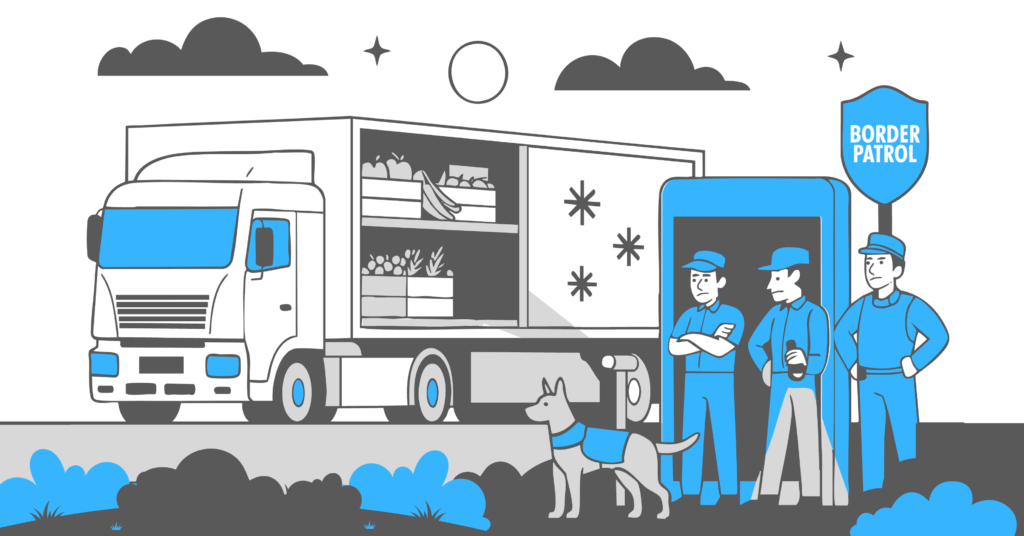Refrigerated Truck Drug Smuggling: How Cartels Exploit Reefers

Refrigerated Truck Drug Smuggling using refrigerated trucks, which are often called “reefers,” are a big part of trade between the US and Mexico. These trucks bring medicine, frozen food, and fresh food across borders while keeping them at the right temperature. Grocery stores wouldn’t have fresh fruits and vegetables on their shelves, and hospitals wouldn’t get the supplies they need on time if they didn’t have these vehicles.
But the same things that make reefers important for everyday life also make them appealing to drug cartels. Smugglers use these trucks to hide drugs because they know that border agents are often under pressure to move goods that will spoil quickly. In the past few years, drug traffickers have hidden millions of dollars worth of drugs inside refrigerated trailers that looked like shipments of fruits or frozen goods.
This article talks about why traffickers go after refrigerated trucks, gives examples of real smuggling cases, and tells trucking companies how to avoid being taken advantage of and understand how refrigerated truck drug smuggling works. It is essential to protecting their business from legal, financial, and reputational risks.
How Refrigerated Truck Drug Smuggling Works at the Border
Drug cartels like refrigerated trucks because refrigerated truck smuggling has a lot of benefits, such as:
- Harder to detect: The thick insulated walls and cooling systems make it harder for border agents and detection dogs to find drugs that are hidden. Some scanning tools may also not work well in cold weather.
- Large space to hide drugs: A reefer can hold thousands of boxes, which makes it a great place to hide drugs. Cartels can hide illegal packages deep inside a load and cover them with real goods. This makes the illegal goods less obvious.
- Rushed inspections: Fruits, vegetables, and other things that go bad quickly need to move quickly. Inspectors know that delays can cause things to go bad, so they sometimes check these loads faster than they check loads that don’t go bad.
Traffickers know they can keep trying until something gets through because there are thousands of refrigerated shipments crossing borders every day.
Real Cases of Refrigerated Truck Drug Smuggling
Frozen Raspberries and $996,000 Worth of Cocaine
In July 2025, U.S. Customs and Border Protection officers at the World Trade Bridge in Laredo, Texas, stopped a reefer that was supposed to be carrying frozen raspberries. After looking around, they found 74.6 pounds of cocaine hidden in the trailer’s battery compartment., The drugs were worth about $996,000 on the street.
This case shows how smugglers use refrigerated trucks to their advantage. The shipment looked normal, and since raspberries go bad quickly, people thought the load would move quickly through the border. The trucking company said it didn’t know about the drugs, which shows that even real businesses can be tricked or used as cover.
Liquid Meth Hidden in Fuel Tanks
In April 2025, Border Patrol agents in Murrieta, California, stopped a semitruck and found 761 pounds of liquid methamphetamine hidden in the truck’s fuel tanks. It was valued at over $680,000. This was the largest meth seizure in that area in two years.
This example shows how traffickers think creatively. Instead of hiding drugs in the cargo, they built compartments into other parts of the truck. It proves that smugglers will use any method possible if it gives them a chance to pass inspection.
How Cartels Infiltrate Trucking Supply Chains
Cartels use different ways to get access to trucks and drivers. Some of the most common are:
- Recruiting drivers directly: Some drivers are bribed with large sums of money, while others may be threatened into cooperating. The promise of quick financial gain can tempt drivers who are struggling financially.
- Fake shipping contracts: Traffickers pretend to be legitimate shippers and book loads through freight brokers. Once the load is booked, they add illegal cargo into what looks like a normal shipment.
- Setting up fake trucking companies: Cartels sometimes create their own companies with clean paperwork and all the necessary licenses. These businesses look legitimate from the outside but are designed for smuggling.
- Exploiting subcontracting: Large carriers often subcontract loads to smaller companies. Once the load changes hands, smugglers can take advantage of the weaker security controls among smaller operators.
Each of these methods increases the risk for trucking companies, even if they are unaware that something illegal is happening.
The Consequences for Trucking Companies
Even when they are not aware of it, trucking companies can face serious consequences if their trucks are used for smuggling:
- Loss of trucks and trailers: Authorities can seize any vehicle linked to trafficking. For smaller carriers, losing one or two trucks can shut down operations.
- Legal problems: Companies may face heavy fines or criminal charges if investigators find they failed to take proper precautions.
- Loss of customers: Shippers and brokers will likely cut ties immediately if a carrier is caught up in smuggling, even if the company was not directly involved.
- Reputation damage: Once a company’s name is connected to trafficking, rebuilding trust is extremely difficult. Many customers will never return.
For small and mid-sized carriers, even one incident can be enough to put them out of business.
Lessons from Border Enforcement
Although border officials are getting better at inspecting, traffickers are still evolving. For instance, CBP officers at the Otay Mesa Commercial Facility found 2,686 pounds of methamphetamine concealed within a tractor-trailer’s floor frame in October 2024. The estimated value of the drugs was $3.2 million.
During a secondary inspection, the shipment was discovered using drug-sniffing dogs and sophisticated imaging equipment. This case demonstrates the increasing effectiveness of enforcement, but it also demonstrates the tenacity of traffickers. In the absence of sophisticated technology, the truck might have gone undetected.
What the Trucking Industry Can Do about Refrigerated Truck Drug Smuggling
Despite the fact that they cannot eliminate every risk, trucking companies can take the following doable precautions to stay safe:
Boost Driver Screening
- Carefully check the driver’s references and work history.
- Where permitted, run criminal background checks
- Keep an eye out for abrupt changes in drivers’ lifestyles, such as the purchase of pricey new homes or cars, as these could indicate outside income.
Strengthen Security for Cargo
- Make use of electronic seals that log each time a trailer is opened.
- Set up GPS tracking devices to notify dispatchers in the event that the truck deviates from its authorized path.
- Install tamper-evident locks on trailers to make it obvious when someone tries to open them without authorization.
Boost Broker Communication
- Always get direct confirmation from shippers, particularly when dealing with new clients.
- Loads that pay significantly more than usual but provide little information about the cargo should be avoided.
- Instead of accepting sporadic high-paying offers, cultivate enduring relationships with reliable brokers.
Work together with the Border Police
- Notify law enforcement of any dubious offers, requests, or cargo.
- Establish open channels of communication with border guards to position your business as a collaborator in maintaining the security of trade.
Final Take
Refrigerated truck drug smuggling is a serious threat because refrigerated trucks are a solid component of international trade and can serve as cover for smuggling operations, drug cartels target them. Real-life examples of how traffickers take advantage of weak points in the supply chain.
In addition to financial risk, trucking companies also face legal and reputational risks. Carriers can lessen their vulnerability to exploitation by closely screening drivers, enhancing communication with brokers, strengthening security protocols, and collaborating with border authorities.
For the safe transportation of food and medications, refrigerated trucks are necessary. The industry can stop them from being used as instruments of organized crime by putting in place the right safeguards.
Stay informed: Subscribe to our newsletter for more case studies, industry insights, and practical guides on keeping your fleet safe and compliant.
Smarter Coverage. Real Support. No Hassle.
